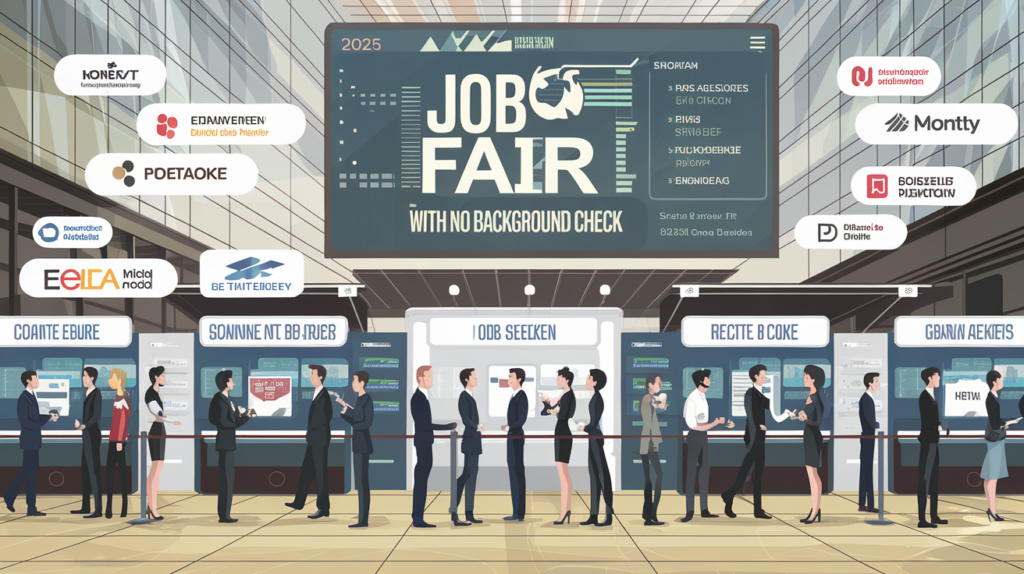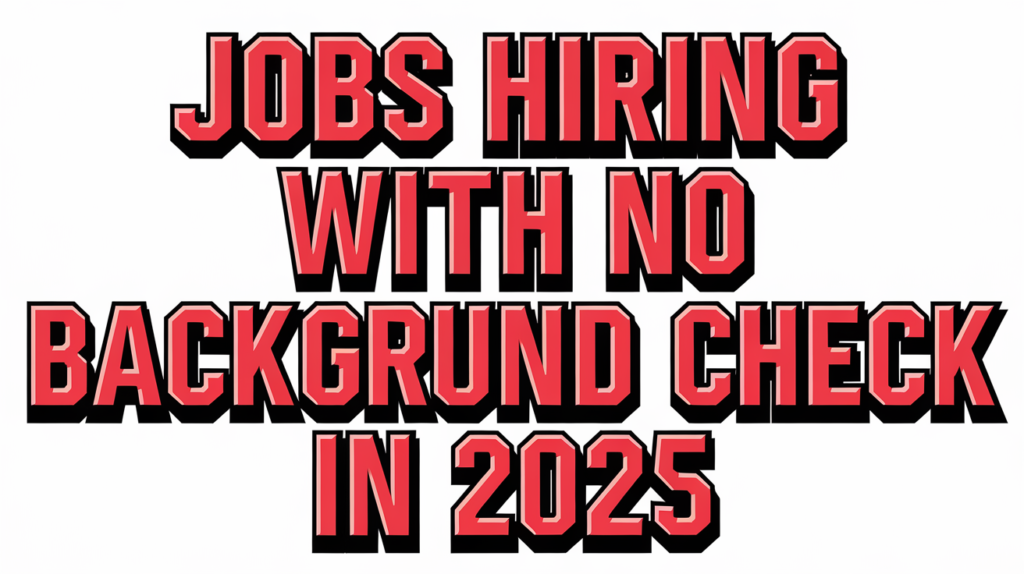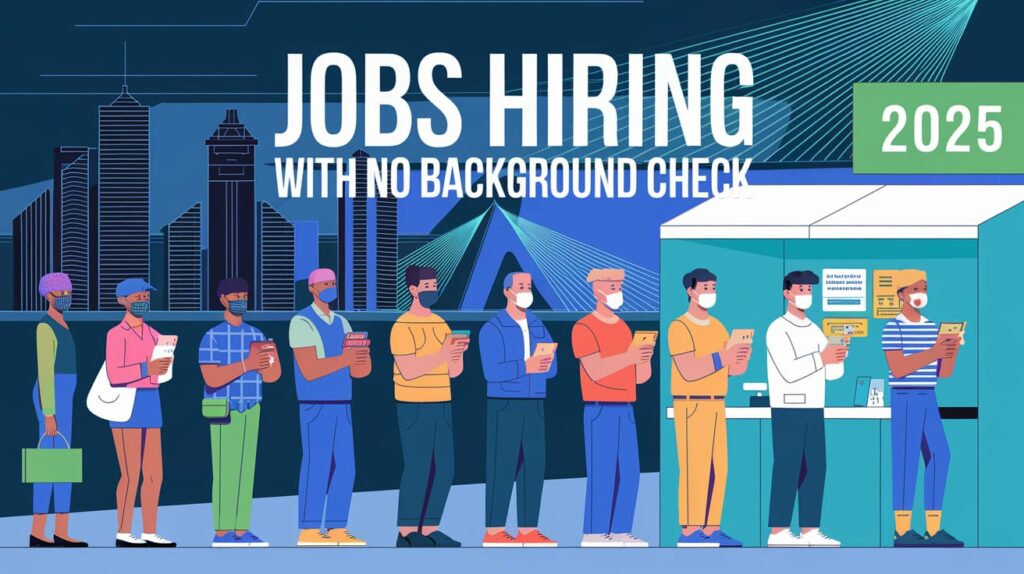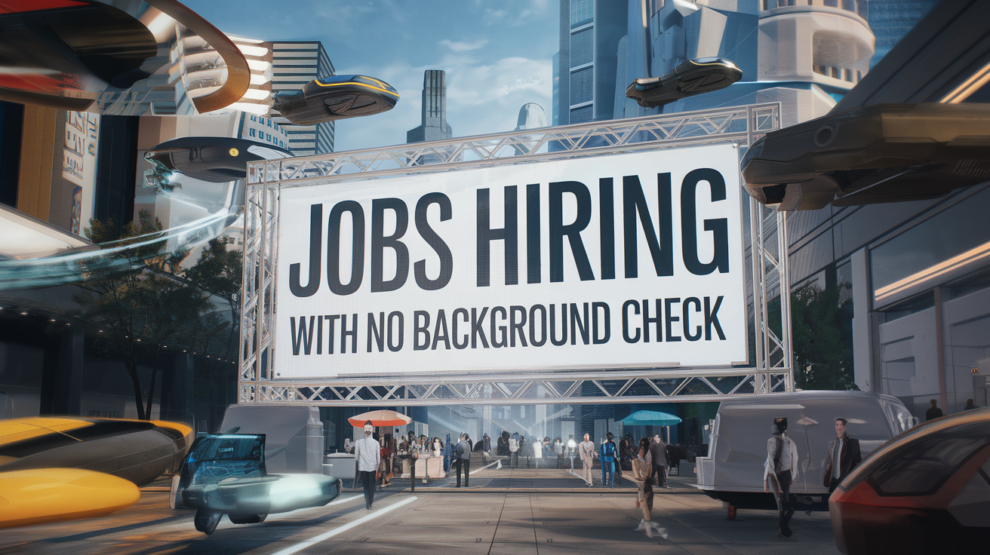Unlock Your Career in 2025: Discover High-Demand Jobs That Skip Background Checks and Offer a Fresh Start!
Table of Contents
In today’s fast-paced job market, securing employment can be daunting, particularly for individuals with criminal records, employment gaps, or limited formal work history. Background checks, which often include criminal, credit, or employment history reviews, can pose significant barriers for some job seekers. However, in 2025, a growing number of employers are prioritizing skills, reliability, and immediate availability over extensive vetting processes. This trend is driven by labor shortages, high turnover in certain industries, and a shift toward inclusive hiring practices. This blog post dives into the landscape of jobs that don’t require background checks, exploring the types of roles available, why employers skip these checks, and how you can navigate this opportunity-rich space to land a job. Whether you’re seeking a fresh start or quick employment, understanding these opportunities can open doors to a brighter career future.
Top Jobs Hiring with No Background Check Required in 2025
In 2025, the job market continues to evolve, with many employers prioritizing speed, skills, and availability over extensive vetting processes like background checks. This trend is particularly pronounced in industries with high turnover, labor shortages, or a focus on portfolio-based work. For job seekers facing barriers—such as criminal records, employment gaps, or limited formal experience—these roles offer accessible pathways to employment. Below, we explore five top job categories that commonly hire without requiring background checks in 2025, detailing the nature of the work, why checks are often skipped, required skills, potential employers, salary expectations, and opportunities for growth.
1. Restaurant and Bar Staff
The food service industry, employing over 14.7 million workers in the U.S. (based on 2023 Bureau of Labor Statistics data, with steady growth projected), is known for its high turnover, often exceeding 70% annually. Roles such as servers, bartenders, line cooks, dishwashers, and hosts are in constant demand, particularly in fast-paced environments like restaurants, bars, cafes, and food trucks.
Why No Background Checks?: Small, independent restaurants, food trucks, and seasonal venues prioritize rapid hiring to meet immediate staffing needs, especially during peak seasons like holidays or summer. Background checks, costing $30-$100 per candidate and taking days to process, can delay onboarding in an industry where every shift counts. Many employers rely on interviews, trial shifts, or references to assess candidates, focusing on attitude and availability rather than past records.
Skills and Qualifications:
- Servers and Hosts: Strong communication, customer service skills, and the ability to work under pressure. Basic math for handling payments is a plus.
- Bartenders: Knowledge of mixology or a bartending certification (e.g., TIPS or ServSafe Alcohol, often costing $40-$100) can set candidates apart, though not always required.
- Line Cooks and Dishwashers: Ability to follow recipes, handle kitchen equipment, or maintain hygiene standards. Physical stamina is key for fast-paced environments.
- No formal education is typically required, though a high school diploma may be preferred for front-of-house roles.
Potential Employers: Local diners, chain restaurants (e.g., Applebee’s, Chipotle), bars, food trucks, and catering companies. Job boards like Indeed or Snagajob list thousands of these openings daily, often with “immediate start” tags.
Salary Expectations:
- Servers: $12-$20/hour (including tips, which can significantly boost earnings in high-traffic venues).
- Bartenders: $15-$25/hour (with tips, potentially $30+/hour in upscale bars).
- Line Cooks: $14-$18/hour.
- Dishwashers: $12-$16/hour.
- Salaries vary by location, with urban areas offering higher wages due to cost of living.
Growth Opportunities: Entry-level roles can lead to supervisory positions like shift manager or kitchen manager within 1-2 years. Bartenders can transition to bar management or open their own venues. Certifications in food safety (e.g., ServSafe, ~$15-$150) or hospitality management courses can pave the way to higher-paying roles.
2. Construction Workers

The construction industry, driven by infrastructure projects and housing demands, faces a persistent labor shortage, with an estimated need for 650,000 workers annually (Associated Builders and Contractors, 2024). Entry-level roles like general laborers, painters, drywall installers, or flaggers are accessible to those without extensive vetting.
Why No Background Checks?: Construction firms, especially small contractors or subcontractors, prioritize skills and physical capability to meet tight project deadlines. Background checks are often seen as unnecessary for manual labor roles, where certifications like OSHA 10-hour training ($25-$100 online) or demonstrated work ethic during a trial day take precedence. The urgency to fill roles in a competitive labor market further reduces reliance on checks.
Skills and Qualifications:
- Physical fitness and ability to handle manual tasks (e.g., lifting 50+ pounds, operating basic tools).
- Basic knowledge of safety protocols; OSHA 10-hour certification is highly valued but not always mandatory.
- For specialized roles like painting or drywall, prior experience or a brief apprenticeship may be preferred but not required.
- No formal education is needed, though trade school certificates can enhance prospects.
Potential Employers: Local construction firms, subcontractors, or large companies like Bechtel or Turner Construction. Job boards like ConstructionJobs.com or local union halls (e.g., Laborers’ International Union) often list openings. Visiting active construction sites to inquire directly can also yield opportunities.
Salary Expectations:
- General Laborers: $15-$22/hour.
- Painters or Drywall Installers: $18-$25/hour.
- Flaggers: $14-$20/hour.
- Wages are higher in unionized roles or urban areas with high demand.
Growth Opportunities: Entry-level workers can advance to skilled trades like carpentry, electrical work, or plumbing through apprenticeships (often paid, lasting 2-4 years). Obtaining certifications like OSHA 30 or specialized trade licenses can lead to supervisory roles or self-employment, with earnings of $30+/hour.
3. Landscaping and Maintenance
Landscaping and maintenance roles, including groundskeepers, lawn care technicians, and janitorial staff, are in demand due to the need for property upkeep in residential, commercial, and public spaces. These jobs are often seasonal or project-based, making them accessible for quick hiring.
Why No Background Checks?: Small landscaping companies or property management firms prioritize candidates who can start immediately and handle physical tasks. Background checks are often skipped to save costs and time, especially for seasonal work. Employers may rely on references or a trial day to evaluate reliability and work quality.
Skills and Qualifications:
- Physical stamina for tasks like mowing, pruning, or cleaning (e.g., lifting 40-50 pounds, standing for long periods).
- Basic knowledge of landscaping tools (mowers, trimmers) or cleaning equipment; training is often provided on the job.
- No formal education required, though a driver’s license may be needed for roles involving travel between sites.
- Customer service skills are a plus for client-facing roles.
Potential Employers: Local landscaping companies, property management firms (e.g., Greystar), or municipal parks departments. Platforms like TaskRabbit or local Craigslist postings often list landscaping jobs. Community job boards at libraries or hardware stores may also advertise openings.
Salary Expectations:
- Landscapers: $14-$20/hour.
- Groundskeepers: $13-$18/hour.
- Janitorial Staff: $12-$17/hour.
- Wages may increase with experience or in high-demand regions.
Growth Opportunities: Workers can advance to crew leader or supervisor roles within 1-3 years, earning $20-$30/hour. Learning specialized skills like irrigation systems or arboriculture (e.g., through online courses costing $50-$200) can lead to higher-paying positions or starting a small landscaping business.
4. Freelance and Gig Work
The gig economy, projected to account for 50% of the U.S. workforce by 2027 (Upwork, 2024), offers freelance roles in writing, graphic design, transcription, social media management, and more. These jobs are typically remote, allowing workers to build careers from anywhere.
Why No Background Checks?: Freelance platforms like Upwork, Fiverr, and Freelancer prioritize portfolios, client reviews, and test projects over formal vetting. Clients seek results-driven freelancers, judging candidates on work samples or proposals rather than personal histories. This makes gig work ideal for those with non-traditional backgrounds.
Skills and Qualifications:
- Writing/Editing: Strong grammar, research skills, and ability to meet deadlines. A portfolio of 3-5 samples (e.g., blog posts, articles) is often sufficient.
- Graphic Design: Proficiency in tools like Adobe Photoshop or Canva; a portfolio showcasing logos, banners, or social media graphics.
- Transcription: Typing speed of 60+ words per minute and accuracy; platforms like Rev require a skills test but no background check.
- Basic computer literacy and reliable internet access are essential for remote work.
- No formal education is required, though online courses (e.g., Coursera, $10-$50/month) can enhance skills.
Potential Employers: Platforms like Upwork, Fiverr, Freelancer, Rev, and TranscribeMe connect freelancers with clients. Small businesses or startups may also hire directly through LinkedIn or job boards like ProBlogger.
Salary Expectations:
- Writers: $20-$50/hour, depending on niche (e.g., technical writing pays more).
- Graphic Designers: $25-$60/hour, based on complexity.
- Transcriptionists: $15-$30/hour, with per-minute rates (e.g., $1-$2/audio minute on Rev).
- Earnings vary by project volume and client budget.
Growth Opportunities: Freelancers can build a client base, leading to consistent work or higher rates ($50-$100+/hour for specialized niches). Transitioning to full-time roles with agencies or starting a freelance business (e.g., content agency) is possible with experience and networking.
5. Pet Care Services
Pet care roles, such as dog walking, pet sitting, and grooming, are in high demand, particularly in urban areas with busy pet owners. These jobs offer flexibility and are often accessible to those with limited formal experience.
Why No Background Checks?: Small pet care businesses or individual clients (e.g., through Rover or Wag) rely on trust, referrals, or brief interviews rather than formal checks. The low-risk nature of these roles, combined with the need for quick hiring, reduces the need for background vetting. Clients may prioritize reviews or a trial walk over extensive screening.
Skills and Qualifications:
- Comfort with animals and basic knowledge of pet care (e.g., feeding, walking, administering medication).
- Reliability and punctuality, as clients depend on consistent schedules.
- A driver’s license or access to transportation may be needed for multi-client routes.
- No formal education required; pet first aid certification ($20-$50 online) can boost credibility.
Potential Employers: Platforms like Rover, Wag, or Care.com connect pet caregivers with clients. Local pet stores, veterinary clinics, or community boards may also advertise opportunities. Independent pet sitters can find clients through word-of-mouth or social media.
Salary Expectations:
- Dog Walkers: $15-$25/hour, with $20-$30 per 30-minute walk in urban areas.
- Pet Sitters: $12-$20/hour, or $50-$100/day for overnight care.
- Groomers: $18-$30/hour, depending on experience and location.
- Tips and repeat clients can increase earnings.
Growth Opportunities: Pet caregivers can scale to full-time roles or start their own businesses, hiring additional staff. Certifications in grooming or pet training (e.g., through the National Dog Groomers Association, $100-$500) can lead to higher-paying niches, with groomers earning $40+/hour independently.
Why Some Employers Skip Background Checks—and What It Means for You

Background checks can be costly, ranging from $30 to $100 per candidate, and time-consuming, often taking days or weeks to complete. In industries with high turnover or urgent staffing needs, employers may skip these checks to save resources and fill positions faster. For example, restaurants facing a busy holiday season or construction firms racing to meet project deadlines prioritize speed over exhaustive vetting. Additionally, some employers adopt inclusive hiring practices, recognizing that past mistakes—such as minor criminal records—may not reflect a candidate’s current abilities or work ethic.
For job seekers, this creates both opportunities and responsibilities:
- Opportunity: You can secure employment quickly, often within days, which is critical for those needing immediate income. This is especially beneficial for individuals with criminal records, as “ban-the-box” laws in some regions encourage employers to delay criminal history inquiries.
- Responsibility: Without background checks, employers rely heavily on interviews, references, and first impressions. You’ll need to demonstrate reliability through a polished resume, strong communication skills, and, if possible, references or work samples. For example, a construction employer might ask for a trial day to assess your skills, placing the burden on you to prove your competence upfront.
However, be cautious: some employers who skip background checks may do so to cut corners, which could signal less reputable operations. Always verify the legitimacy of the employer to avoid scams or exploitative work environments.
Industries That Commonly Hire Without Background Checks
Certain industries are more likely to forgo background checks due to their operational models and staffing needs. Here’s a closer look:
- Food Service: With 14.7 million workers and a turnover rate exceeding 70% annually, restaurants, cafes, and bars prioritize filling roles like servers, cooks, and baristas quickly. Small, family-owned establishments or seasonal venues (e.g., food trucks) often rely on informal hiring processes, focusing on attitude and availability.
- Construction: The construction industry, driven by infrastructure investments and housing shortages, faces a persistent labor gap. Employers often hire laborers, carpenters, or painters based on skills or certifications, such as OSHA 10-hour training, rather than delving into personal histories.
- Hospitality and Retail: Hotels, cleaning services, and small retail shops frequently hire for entry-level roles like housekeepers, front desk staff, or cashiers without background checks. These industries value dependability and customer-facing skills, often assessing candidates through short interviews or trial shifts.
- Freelance and Creative Industries: Freelancers in fields like graphic design, content creation, or social media management are judged on portfolios and client feedback. Platforms like Upwork or Behance allow professionals to showcase their work, making background checks irrelevant in most cases.
These industries offer fertile ground for job seekers, particularly those who may face barriers in sectors with stricter vetting, such as finance or healthcare.
Remote and Gig Jobs That Don’t Require a Background Check
The rise of remote work and the gig economy has expanded access to jobs that prioritize skills over background checks. Here are key opportunities in 2025:
- Transcription: Companies like Rev, TranscribeMe, and GoTranscript hire freelancers to transcribe audio files, focusing on typing speed (e.g., 60+ words per minute) and accuracy. Candidates typically complete a skills test, and no background check is required, making this ideal for remote work beginners.
- Freelance Writing or Design: Platforms like Upwork, Fiverr, and ProBlogger connect writers, editors, and designers with clients who evaluate bids based on portfolios or proposals. For example, a graphic designer can secure projects by showcasing past logos or branding work, bypassing formal vetting.
- Virtual Assistance: Virtual assistants handle tasks like scheduling, email management, or customer support. Many small businesses or entrepreneurs hire through platforms like Fancy Hands or Belay, relying on resumes and interviews rather than background checks.
- Delivery Services: Gig platforms like DoorDash, Uber Eats, or Instacart require basic eligibility checks (e.g., a valid driver’s license or vehicle insurance) but often skip comprehensive background screenings for independent contractors. These roles offer flexibility and quick onboarding.
These remote and gig roles are particularly appealing for their accessibility and flexibility, allowing workers to build income and experience from virtually anywhere.
Best Practices for Landing a Job with No Background Screening
Securing a job without a background check requires proactive strategies to stand out and build trust with employers. Here are detailed best practices:
- Tailor Your Resume: Customize your resume to highlight relevant skills and achievements. For example, a server applicant might note “increased table turnover by 15% through efficient service.” Use action verbs and quantify results where possible, as 68% of hiring managers spend less than two minutes reviewing resumes, per a CareerBuilder survey.
- Leverage References: Provide 2-3 professional or personal references who can vouch for your reliability and skills. A 2020 CareerBuilder study found that 80% of employers contact references, so choose individuals who can speak to your work ethic or character. If you lack professional references, consider mentors, former coworkers, or community leaders.
- Network Locally: Attend job fairs, visit local businesses, or join community groups to learn about openings. For instance, approaching a restaurant manager directly during off-peak hours can lead to an immediate interview. Local job boards at libraries or community centers also list opportunities in high-turnover industries.
- Be Honest and Transparent: If an employer asks about your background, disclose relevant information concisely while emphasizing your rehabilitation or current skills. The Equal Employment Opportunity Commission (EEOC) advises that honesty builds trust, especially in roles where background checks are skipped. If your record is sealed or expunged, you can legally state “no record” in most cases.
- Upskill and Certify: Obtain industry-specific certifications to boost your appeal. For example, a free online course in food safety for restaurant jobs or an OSHA 10-hour certification for construction can set you apart. Platforms like Coursera or Alison offer affordable training options.
These practices help you present yourself as a capable and trustworthy candidate, even without a formal background check.
Pros and Cons of Jobs That Don’t Require a Background Check
Like any employment opportunity, jobs without background checks have advantages and drawbacks. Here’s a balanced breakdown:
Pros:
- Quick Hiring Process: Without the delay of background checks, you can start working within days, ideal for those needing immediate income.
- Inclusivity for Diverse Backgrounds: These roles provide opportunities for individuals with criminal records, employment gaps, or non-traditional career paths, aligning with “second chance” hiring initiatives.
- Skill-Focused Hiring: Employers prioritize your current abilities, such as customer service skills or manual labor proficiency, over past mistakes.
Cons:
- Lower Starting Pay: Many no-background-check jobs are entry-level, with wages often starting at $15-$20 per hour, below the national average for specialized roles.
- Job Instability: High-turnover industries like food service or retail may offer less job security, with seasonal or project-based roles common.
- Limited Career Advancement: Entry-level positions may lack clear paths to promotion, requiring additional training or experience to move into higher-paying roles.
Weighing these factors can help you decide if these jobs align with your career goals and financial needs.
Legal and Privacy Considerations in No-Background-Check Jobs

Even in jobs without background checks, legal and privacy considerations play a role. The Fair Credit Reporting Act (FCRA) mandates that employers obtain written consent before conducting any background check through a third-party agency, even if it’s minimal. If an employer skips this process entirely, it may indicate informal hiring practices, which can be a double-edged sword: it speeds up hiring but may signal a lack of professionalism or oversight.
Additionally, “ban-the-box” laws, adopted in 35 states and over 150 localities as of 2025, prohibit employers from asking about criminal history early in the hiring process. This protects applicants by delaying such inquiries until a conditional offer is made, giving you a chance to showcase your skills first. However, these laws vary by state—Massachusetts and Hawaii have robust protections, while states like West Virginia lack statewide bans.
Privacy concerns also arise with less reputable employers. Some may request sensitive information (e.g., Social Security numbers) without clear justification, raising risks of identity theft. Always verify an employer’s legitimacy through reviews on platforms like Glassdoor or the Better Business Bureau. If a job offer seems too good to be true or requests upfront payments, it’s likely a scam.
How to Find Legitimate No Background Check Jobs Online and Locally
Finding legitimate no-background-check jobs requires diligence and strategic searching. Here’s how to approach it:
- Online Platforms: Use job boards like Indeed, Monster, or LinkedIn with filters like “entry-level,” “no experience required,” or “immediate start.” Specialized platforms like jailstojobs.org or 70millionjobs.com cater to individuals with criminal records, listing employers open to second-chance hiring. Freelance platforms like Upwork, Fiverr, or TaskRabbit are ideal for gig work, requiring only a profile and portfolio.
- Local Opportunities: Visit high-turnover businesses like restaurants, retail stores, or construction sites in person. For example, inquire at a local diner during off-peak hours or check job postings at community centers, libraries, or grocery store bulletin boards. Local job fairs, often advertised through city websites or chambers of commerce, connect you directly with employers.
- Networking: Build connections through LinkedIn, community groups, or industry-specific meetups. For instance, joining a local construction trade group or attending a hospitality job fair can lead to referrals. Personal recommendations from friends or former coworkers can also open doors.
- Verify Legitimacy: Research employers before applying. Check their ratings on Glassdoor, Yelp, or the Better Business Bureau. Be wary of job listings that lack clear company details, promise unusually high pay for minimal work, or request payment for “training” or “equipment.” The Federal Trade Commission (FTC) advises confirming a company’s physical address and contact information to avoid scams.
By combining online and local strategies, you can uncover legitimate opportunities tailored to your skills and circumstances.
FAQs
Q: Are no-background-check jobs legitimate?
Many are legitimate, particularly in high-turnover industries like food service, construction, or gig work. However, some scams target vulnerable job seekers. Verify employers through reviews on Glassdoor or the Better Business Bureau, and avoid jobs requiring upfront payments or personal financial information.
Q: Can I move to higher-paying roles from these jobs?
Yes, no-background-check jobs can serve as stepping stones. Gain experience, build references, and pursue certifications (e.g., ServSafe for food service or OSHA for construction) to qualify for better-paying roles. Networking and upskilling are key to career progression.
Q: Do all states have ban-the-box laws?
No, ban-the-box laws vary. As of 2025, 35 states, including California and Illinois, have adopted these laws for public or private employers, delaying criminal history questions until later in the hiring process. States like West Virginia lack statewide mandates, so check local regulations.
Q: What if an employer asks about my criminal history during an interview?
Be honest but concise, focusing on your rehabilitation, skills, and commitment to the role. For example, say, “I’ve made mistakes in the past, but I’ve completed [program/training] and am focused on contributing positively.” If your record is sealed or expunged, you can legally state “no record” in most jurisdictions, per EEOC guidelines.
Conclusion
In 2025, jobs that don’t require background checks offer a vital lifeline for job seekers facing employment barriers, from criminal records to gaps in work history. Roles in food service, construction, landscaping, and the gig economy provide accessible entry points, emphasizing skills and reliability over past mistakes. By tailoring your resume, leveraging references, networking strategically, and pursuing relevant certifications, you can stand out to employers in these high-demand sectors. However, remain vigilant about legal protections and job legitimacy to avoid scams or exploitative employers. With the right approach—combining online searches, local outreach, and proactive preparation—you can secure a no-background-check job and build a foundation for long-term career success. Start exploring these opportunities today to take control of your professional journey.
Do Follow Dragcast on Social Media For More Such Content.












Add Comment